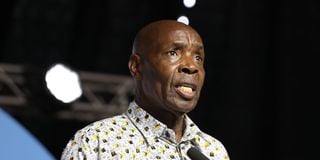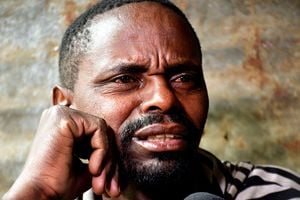Ministry of Education says no to school fees increase

Education Cabinet Secretary Ezekiel Machogu during the 20th Kenya Primary Schools Heads Association Conference in Mombasa on November 8, 2023
The Ministry of Education has warned head teachers against increasing fees in junior and secondary schools.
Education Cabinet Secretary Ezekiel Machogu said fees for boarding schools will remain at the current rate approved by the government.
Mr Machogu was speaking during the official opening of the 20th Kenya Primary Schools Head Teachers' Conference at Sheikh Khalifa Bin Zayed Primary School in Mombasa on Wednesday (November 8).
"There is no intention on the part of the William Ruto-led government to increase school fees in secondary or junior secondary schools. Boarding school fees will remain at the currently approved rates," Mr Machogu said.
Last month, the Kenya Secondary Schools Heads Association said principals will increase school fees from January 2024 due to the high cost of living.
Capitation
Principals have been struggling due to the irregular release of capitation to run the institutions. The high cost of living has forced suppliers to cut food supplies to boarding schools.
The situation is so bad that headmasters have told Nation.Africa that some suppliers have blacklisted some schools because of huge debts.
Most secondary schools are struggling with huge debts, including school fee arrears running into millions of shillings.
The CS, however, cited Article 53 of the Constitution, which states that basic education is free and compulsory.
"Going against this provision in the constitution is a violation of the law. Anyone who does not want to be a head teacher can resign. There are many Kenyans who are willing to take up these opportunities and abide by the regulations," he said.
The CS said some head teachers had gone rogue, with some secondary schools charging between Sh150,000 and Sh200,000 a year.
"Education is becoming unaffordable for many Kenyans. It is becoming the preserve of the rich and that is why the government has said no because a lot of the money being charged is going into people's pockets," the CS said.
He said the government will continue to support schools and learners through capitation as it strives to provide free and compulsory basic education.
Currently, the government provides Sh1,420 per learner. For junior schools, the government provides a capitation grant of Sh15,042 per pupil. Students in secondary schools receive Sh22,240.
Support schools
He said the government will continue to support schools and learners through the capitation.
School administrators will be required to comply with government directives on the matter.
"The fees for boarding schools will remain as they are. Anyone who violates the directive will be punished. Some secondary schools have gone rogue with headmasters charging over Sh200,000," he added.
He expressed the government's commitment to the provision of education, the sector having received the highest budgetary allocation of Sh630 billion, representing 30 per cent of the total national budget.
The allocation will be used to fund capitation, provide textbooks and other learning materials, recruit additional teachers and improve school infrastructure.
At the same time, Mr Machogu said all levels of education from pre-primary, primary to Grade 9 under the comprehensive school system will be managed as one under one head of institution.
Head teachers will be in charge of comprehensive schools and their salaries will be enhanced.
The head of the institution will provide instructional leadership by supporting and promoting effective teaching and management practices.
Leadership
"We must adopt a whole-school approach to school leadership, which involves the collective efforts of all stakeholders, including school leaders, teachers, learners, parents and the wider community, working together towards common goals and objectives," he said.
He assured parents that there are enough places in junior and secondary schools to accommodate all candidates for the Kenya Certificate of Primary Education and Kenya Primary School Education Assessment (KPSEA) in January 2024 in the spirit of 100 per cent transition.
"Adequate measures will be put in place to ensure that the KCSE examination is also conducted with the same level of success," he said.
He urged teachers to nurture and guide learners.





